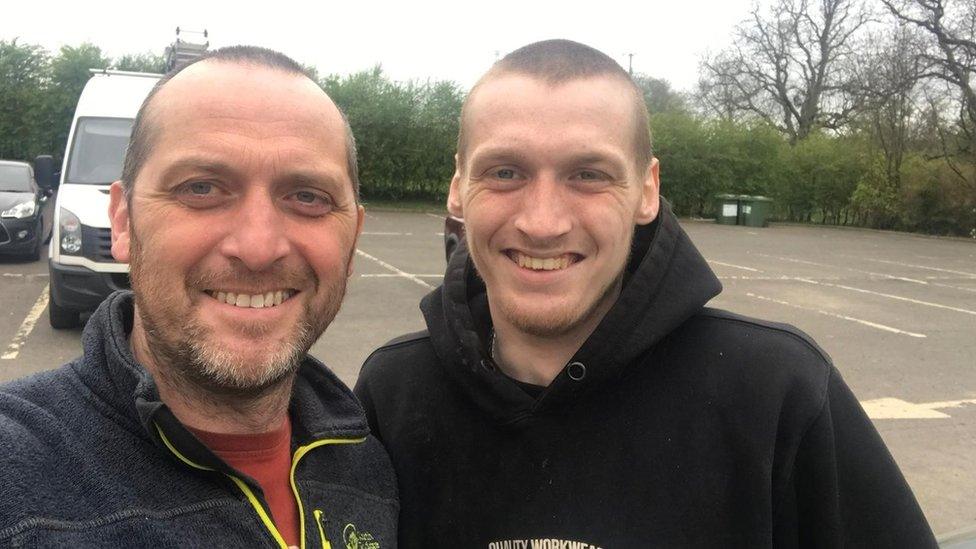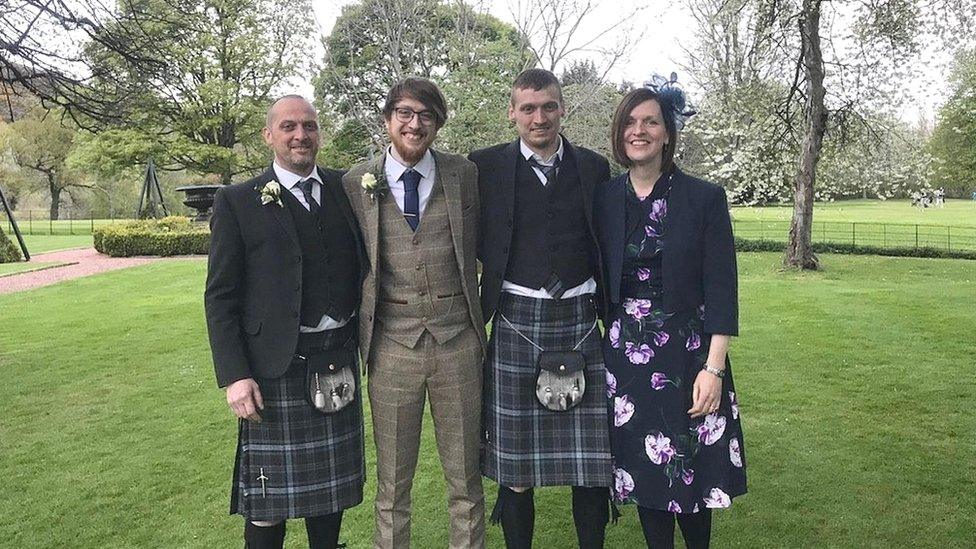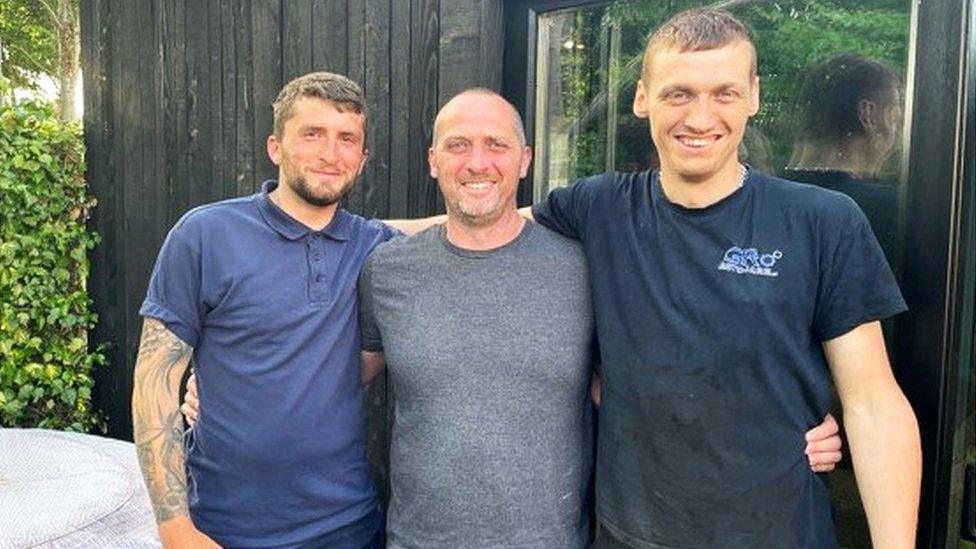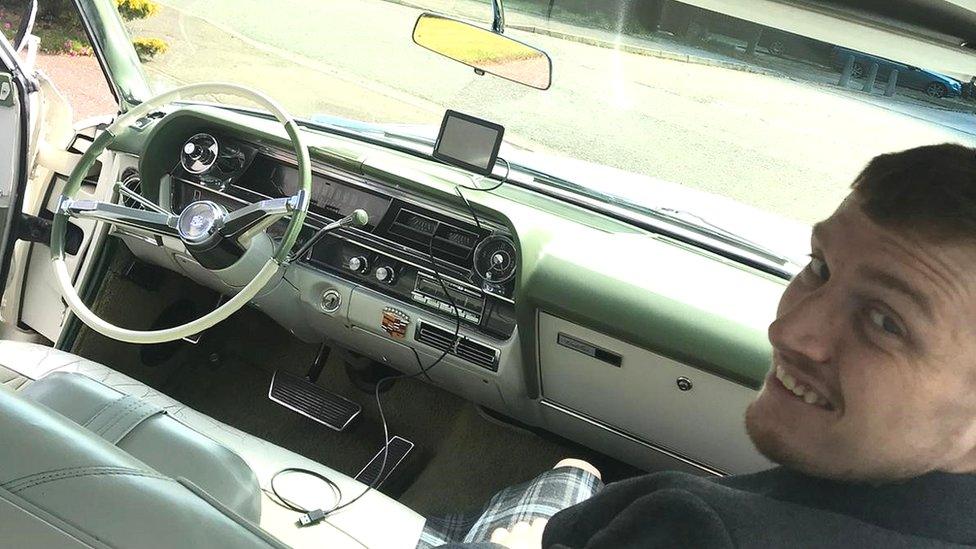'My window visit helped save my son’s life after kidney failure'
- Published

Michael (left) said his son Luke took weeks to return to a normal colour after suffering kidney failure
When Luke Horne started feeling unwell and lost his sense of taste and smell, he began self-isolating because he thought he had Covid.
But when his dad, Michael, came to his East Lothian home to check up on him through his window he saw his 23-year-old son had turned grey and his face and feet were swollen and puffy.
The 46-year-old was so alarmed he told his son to go to his GP.
Blood sample results showed that Luke had end stage kidney failure.
Michael, who lives in East Linton, told BBC Scotland news: "The doctor said he needed to go to the kidney unit at the Edinburgh Royal Infirmary so I said I would drive him.
"That's when the doctor said: 'If we blue light him to the kidney unit he might not survive the 10-minute journey' - and that's when the penny dropped about how serious the situation was.
"I felt stunned and very upset."

The family, with Luke second from the right, at a recent wedding
Luke, who lives in Cockenzie, was kept at the Western General Hospital where doctors had given him his blood test results.
Doctors there put him on kidney dialysis in intensive care for five days until he was stabilised enough to be transported to the high dependency ward in the kidney unit at Edinburgh Royal Infirmary, where he was treated for a further two weeks.
His Covid test result came back negative.
Now, almost six months on, he is hoping his mum, Elaine Horne, 47, will be able to donate a kidney. She is currently undergoing further tests after being told she is a potential match.
When Luke was admitted to hospital shortly before Christmas a test used to check how well the kidneys are working - the glomerular filtration rate (GFR) - was carried out.
A normal level in young adults is between 80 and 120ml/min/1.73m2. Luke's was 5ml. His blood pressure was very high and his potassium levels very low.

Liam Ross Campbell (left) and Luke's dad Michael Horne plan to do a charity cycle
His dad Michael said: "Currently everything is being blamed on Covid so he was convinced he had Covid.
"It has been a whirlwind to get our heads round. He was a healthy, typical young lad and nearly died, yet none of us had a clue. It hit from out of nowhere.
"It took two weeks for Luke to start returning to a normal colour and six weeks to reach a normal weight.
"He is normally slim but had swollen up so much because his body was retaining fluid."
'A close call'
Luke now goes to hospital three nights a week for five-hour sessions of dialysis.
He said he felt very scared when his body started to balloon while he was in his house, where he lives alone.
"It was the unknown, which was terrible. I didn't know what was going on. I felt ill and I kept thinking it must be Covid.
"At the hospital I felt faint and out of it so it was only a few weeks later when I was feeling a bit better that I realised what a close call I have had," he said.
And he added: "It is really nice of my mum to be giving me her kidney, I can't wait."

Luke Horne said he has returned to work as a car mechanic to take his mind off his illness
Luke said he thinks his large consumption of energy drinks played a part in impairing his kidney function. He has now stopped drinking them.
He has returned to work as a car mechanic.
Dad Michael is planning to raise money for Kidney Research UK by entering the 75-miles Tour O The Borders sportive on 5 September with Luke's best friend from primary school, Liam Ross Campbell.
He said: "I'm doing it to raise awareness that these things can happen.
"Luke went from a healthy young lad one day to kidney failure the next.
"I want more drugs to be found that can prolong the lifespan of a donated kidney, because at the moment it's about 20 years."